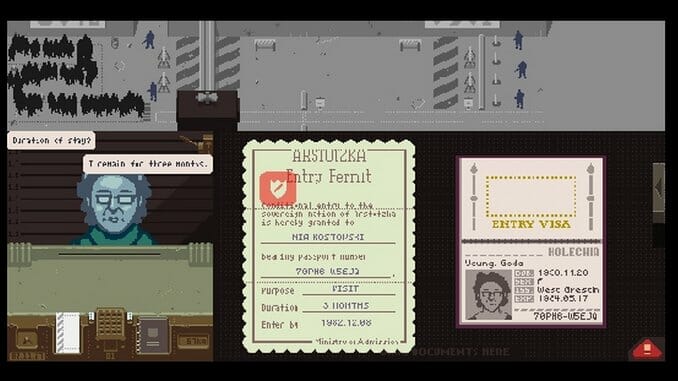Papers, Please (PC/Mac)

Happy belated Labor Day. Having to review Papers, Please over a holiday that encourages reflection upon our relationship to the work that we do seems so brilliantly apt that the only comparison that comes to mind is that Far Side cartoon where a chicken tied to a helium balloon floats into a samurai bar.
Papers, Please takes place in 1988, in a fictional eastern European country called Arstotzka. At the beginning of the game, the protagonist is selected via national lottery to be a border agent. He’s tasked with the daily routine of sitting in a little iron booth and ensuring that everyone passing into the country has their documents in order. True to socialist form, he’s paid for each correct decision he makes. If he makes too many mistakes, his pay is docked and he risks being unable to make rent or support his family.
I don’t have a family unless you count my cat, and I am generally devoid of extra-personal financial obligations unless you count lending my roommate ten dollars and not being especially diligent about getting it back. The pressure on me to do anything other than exactly what I want is extravagantly low, but I’m not independently wealthy (yet), and I’ve had some pretty execrable jobs. So, with confidence: Papers, Please utterly nails the sinking feeling brought on by working a job where professional success means feeling terrible about yourself and digging yourself into a deeper, less escapable hole.
As the days go by and the player is forced to compare travelers’ documents to the increasingly byzantine standards set by Arstotzka’s ruling party, it becomes clear that Papers, Please’s gameplay is not far off from being a high-concept, stylized version of Erotic Photo Hunt. The plot is too general and, eventually, too spectacular to be a faithful recreation of the bummer life of a Soviet-era border guard, and I’m left with the same bleak opinion of the poor guy’s lot that I had before I started the game. Additionally, the details of the protagonist’s family are intentionally kept as general as possible. We feel his stress as his kin fall ill and we’re suddenly on the hook for extra money every day, but from a narrative standpoint they’re just white numbers on a black screen; it’s by no means the story of a family. It’s kind of tough to get into, and after 45 minutes of playing it, I got bored and went to get a coffee.
It’s possible that the caffeine elevated my mood, but after finishing both the coffee and the game, it hit me: Papers, Please is boring, but as a result it also excels as a study of low-wage institutional tedium, and how the possibility of relief from that tedium can cause people to act rashly, in ways that appear to defy self-interest or even logic in general. As the game progresses, the rules governing entry into Arstotzka become progressively more complicated, and both the player and protagonist know that they’re not going to stop. Things are either going to reach a point where we’re not going to be able to process enough immigrants to feed our family, or we’re going to start getting sloppy and risk losing money outright. Amidst this creeping anxiety is the clock-watching tedium of a crappy clerical job. Whether you’re the border guard of a fictional country in 1988 or a striking Papa John’s employee from Brooklyn in 2013, being stuck between that particular rock and that particular hard place is completely dehumanizing, and can weigh on you like nothing else on earth.
When something comes up that offers potential relief from the protagonist’s constant financial anxiety (e.g., getting kickbacks by detaining extra people) or the general repetitiveness of the job (e.g., throwing the book at a human trafficker, or helping a shadowy anti-government organization ferry their members into Arstotzka), the player feels the protagonist’s excitement. In most cases the details are too rushed for these to seem like serious moral issues, but despite the risks I always felt inclined to go along with them just because it was something to do, and because it seemed like the only way to gain a little agency amidst crushing bureaucracy, monotony and poverty. Even when playing along has the potential to get us fined, fired or worse, we remember that the alternative is a lifetime in a tiny, gray booth, separating husbands and wives forever because a piece of paper contains what our boss says are the wrong numbers. We might as well take variety where we can get it.
